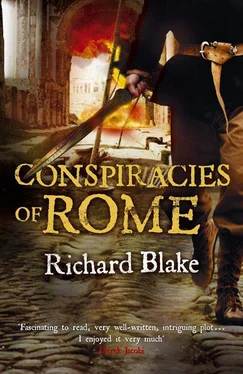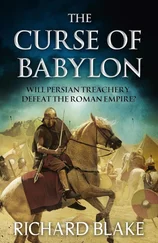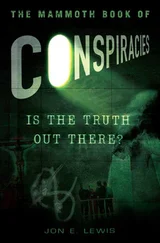Richard Blake - Conspiracies of Rome
Здесь есть возможность читать онлайн «Richard Blake - Conspiracies of Rome» весь текст электронной книги совершенно бесплатно (целиком полную версию без сокращений). В некоторых случаях можно слушать аудио, скачать через торрент в формате fb2 и присутствует краткое содержание. Жанр: Исторические приключения, на английском языке. Описание произведения, (предисловие) а так же отзывы посетителей доступны на портале библиотеки ЛибКат.
- Название:Conspiracies of Rome
- Автор:
- Жанр:
- Год:неизвестен
- ISBN:нет данных
- Рейтинг книги:3 / 5. Голосов: 1
-
Избранное:Добавить в избранное
- Отзывы:
-
Ваша оценка:
- 60
- 1
- 2
- 3
- 4
- 5
Conspiracies of Rome: краткое содержание, описание и аннотация
Предлагаем к чтению аннотацию, описание, краткое содержание или предисловие (зависит от того, что написал сам автор книги «Conspiracies of Rome»). Если вы не нашли необходимую информацию о книге — напишите в комментариях, мы постараемся отыскать её.
Conspiracies of Rome — читать онлайн бесплатно полную книгу (весь текст) целиком
Ниже представлен текст книги, разбитый по страницам. Система сохранения места последней прочитанной страницы, позволяет с удобством читать онлайн бесплатно книгу «Conspiracies of Rome», без необходимости каждый раз заново искать на чём Вы остановились. Поставьте закладку, и сможете в любой момент перейти на страницу, на которой закончили чтение.
Интервал:
Закладка:
‘Did you never think of a military career?’ I asked him.
‘No,’ he said shortly. ‘The days when people like me got given armies to command were over long ago. The Christian emperors made sure to downgrade our place in the world to serving in the civil administration, or to whatever scholarly or other leisure we could organise for ourselves. We were too unreliable for the new order that Diocletian created and Constantine perfected.
‘The armies are for Greek professionals or barbarian mercenaries. My father was prefect once, and had regular meetings with Narses, the first exarch. He was a fine general, but he started out as a eunuch in the Imperial Household. Until Phocas popped up, it made for stability – even if, the occasional Narses aside, it didn’t bring inspired leadership.’
I felt the longing and regret that Lucius hid behind his increasingly smooth flow of explanation. I know he’d have made a brilliant general of the old style. He’d have kept the Lombard out of Italy. Even now, he could have cleared them out. Was this why he’d been so visibly upset by the settlement proposed by the Church?
I slept. I was distantly aware of when we were passing over the compacted gravel that gave us a smoother but slower ride, and then over the great paving slabs that had us swinging and jerking about on our leather suspension.
We rode on. The road stretched on, seemingly forever. We came to a tunnel cut through the rock. We stopped awhile in its shade, and Lucius supervised a change of dressings to my wounds. There was no visible suppuration, I was conscious enough to notice, and the wound in my side was beginning to heal. But, even through the weak opium I’d been given, I could feel my arm stiff and burning. Lucius washed it himself with cold water and rubbed some ointment he’d bought at another of the inns from a travelling apothecary. He accompanied this with some muttered incantations. Either the little Greek on my horse didn’t notice, or he didn’t care.
In the evening, the fever returned with similar force, and we had to go very slowly. The Greek was in a hurry, and didn’t like the delay. But the only person to my knowledge with whom Lucius never managed to pull rank was the emperor himself. Everyone else just fitted around him.
In between short waking spells, I dreamt fitfully through the night. I dreamt that Maximin was looking down at me from heaven. He sat beside a severe, iconic Christ; on his face the same troubled look I’d seen him wearing the last time I’d seen him alive. He spoke to me, but I was again unable to hear what he said.
I dreamt, or think I did, that a wolf came close by the carriage. Lucius and the guards chased it away with their drawn swords.
Then I was back in Rome, though not this time by the broken sewer. I was now with the dispensator. He sat in his office, looking at me with his usual slight distaste. He spoke to me, but no sound came from his lips. He spoke to me again. Still I couldn’t hear or understand. Now impatient, he took me to the door of his office. The entrance hall and labyrinth of tunnels at the front of the Lateran had been abolished. The door of his office opened straight onto the square outside.
Again, I saw that slow, silent triumphal procession. The emperor was shrouded in purple. His carriage stopped close by me. He pointed and pointed at me, until I realised he wanted me to join the procession in my allotted place at the back with the other barbarian prisoners. The flutists and drummers never once stopped their silent, convoluted playing.
I woke bathed in sweat, with the first light of dawn stealing over the rocky landscape from our right. My arm still hurt, but I felt that I was recovering from the fever.
By now, Lucius was increasingly sure we were safe. Closer to Ravenna than to Rome, we were deep into the exarch’s zone of rule. We were passing rapidly down towards sea level, and the air was became appreciably warmer and more oppressive.
We thanked the Greek, and I got unsteadily but with returning strength into my saddle. My last sight of them was far back along the road, where they’d stopped for breakfast.
At Fano, on the Adriatic coast, we turned northwest, following the coastal road towards Rimini.
That evening, there was no return of the fever, and we were able to take turns again at sleeping and watching. But we did this, Lucius said, from simple caution. Even if the dispensator had worked some other miracle, he could have us murdered, or perhaps kidnapped. He was no longer able to have us arrested.
We spoke awhile about nothing in particular. But Lucius was concerned that I should sleep as much as possible.
We passed the sixth day of our journey on the long road between Pesaro and Rimini. On our left, approached by long spurs from the main road, stood walled towns. I could hear the church bells ringing for the Sunday service. Needless to say, we didn’t stop to go in and pray anywhere.
On our right was the Adriatic. Looking out over the flat, gentle expanse of water, I could see the stream of warships and trading ships that connected this outpost of the Empire with the gorgeous East. I could hear the dull, rhythmical thump of the drums that kept the naval oarsman in time together. The trading ships were decked with sails of frequently gorgeous colour.
The East itself was preparing for some struggle of life or death from which it might not emerge. Here, on the edge of the directly ruled Empire, trade and the process of such government as was possible continued as normal. This, I reflected, was how our myrrh must have arrived.
The road was filled with merchants and wheeled traffic and the litters of the wealthy. The occasional band of soldiers passed by us. They gave me an interested look, but returned the greetings Lucius called to them.
That evening, we stopped at another of those inns. Lucius spent a long time after dinner questioning the keeper and the other guests about the news from Ravenna and the East. The wars were going uniformly ill for Phocas. There were rumours of a joint attack by the Persians and barbarians on Constantinople itself. The city couldn’t be taken with those huge double walls that surrounded it and its unbroken command of the seas. But how long could the Empire last with just the capital intact? The provinces, I was told, were either occupied by various enemies or falling away of their own accord.
The main topic of discussion was how long it would be before our exarch in Ravenna declared for one of the African exarch’s sons or some other candidate. There was no fresh news from Carthage or Constantinople. We had a drink with some merchants from Antioch. They told us the city was dissolving into endemic violence between the Greek and Jewish communities. Meanwhile, the Syriac majority was growing more open in its heresy and preparing to receive the Persian king, whenever he should make his expected full descent on Syria.
This was news, I thought with a sudden rush of greed, that would convert easily to gold on the Roman markets.
We had no fresh news from Rome – not that anyone now could possibly have overtaken us. No one had even yet heard that the pope was back from Naples. Circuitously but at length, Lucius questioned everyone about any groups of armed men who weren’t obviously connected with the exarch. There had been no one.
For the first time since leaving Rome, we bathed and passed the night in a bed. I cuddled up close to Lucius in the warm night air, feeling a vague obligation to have sex with him. But he was asleep even before I drifted off. I’d slept badly on the road, he hardly at all with the work of looking after me. I dreamt in disjointed flashes of Rome and the many comforts of Marcella’s house. There was nothing frightening in my dreams.
In the morning, we exercised away some of the stiffness of the long ride behind us, and bathed again after a leisurely breakfast. I managed a small quantity of bread soaked in olive oil. Lucius allowed me no wine.
Читать дальшеИнтервал:
Закладка:
Похожие книги на «Conspiracies of Rome»
Представляем Вашему вниманию похожие книги на «Conspiracies of Rome» списком для выбора. Мы отобрали схожую по названию и смыслу литературу в надежде предоставить читателям больше вариантов отыскать новые, интересные, ещё непрочитанные произведения.
Обсуждение, отзывы о книге «Conspiracies of Rome» и просто собственные мнения читателей. Оставьте ваши комментарии, напишите, что Вы думаете о произведении, его смысле или главных героях. Укажите что конкретно понравилось, а что нет, и почему Вы так считаете.












